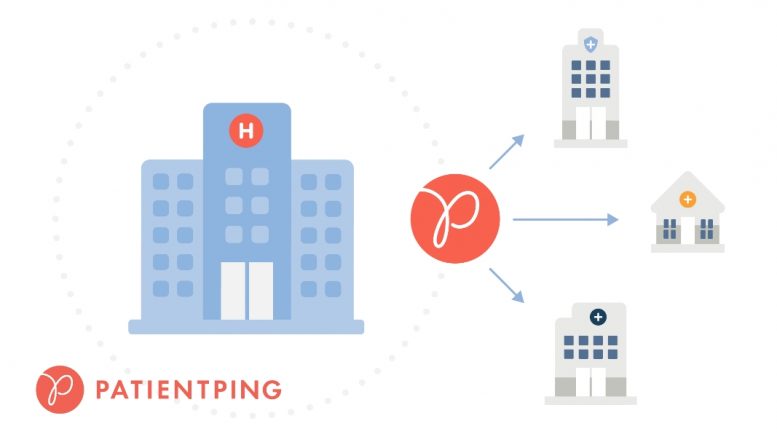According to Survey Data, Just 17% of Hospitals and Health Systems are Familiar with the Condition of Participation Requiring Compliance by May 1, 2021
PatientPing, the nation’s most comprehensive care collaboration platform, today announced the launch of Route, a single solution to ensure hospitals achieve compliance for the electronic patient event notifications (e-notifications) Condition of Participation (CoP) published as part of the Centers for Medicare and Medicaid Services (CMS) Interoperability and Patient Access final rule. Route guarantees full e-notifications CoP compliance by enabling hospitals to send electronic, real-time Admission, Discharge, and Transfer (ADT)-based patient event notifications.
Built on PatientPing’s trusted national e-notifications network, Route alleviates hospitals’ compliance IT and data-sharing burdens to deliver the required electronic ADT event notifications to other providers whenever patients have inpatient or emergency department visits. The solution automatically manages all incoming provider requests for e-notifications via the Route Requester Portal and handles all outbound ADT data feeds to both providers and Health Information Exchanges / intermediaries. Route delivers e-notifications to any providers identified by patients during hospital encounters, such as Primary Care Practitioners, as well as to requesting primary care groups, accountable care organizations, Federally Qualified Health Centers, skilled nursing facilities, and home health agencies— an innovative approach that PatientPing pioneered nearly seven years ago with its Pings solution. Requesting community-based providers have multiple options for the delivery of e-notifications (web application, SMS & email alerts, data exports, HL7 integration) to ensure e-notification delivery is suited to the community providers’ workflow. Route also handles all the complexities around the execution of data share agreements with e-notification recipients.
“Conditions of Participation are a regulatory mechanism that can’t be taken lightly,” said Rick Lang, CIO of Doylestown Health, an independent non-profit health system serving the suburban communities of Philadelphia as well as Hunterdon and Mercer Counties in New Jersey. “A CIO’s nightmare is getting to the 11th hour only to find your compliance solution is inadequate. I chose PatientPing’s solution, Route, because they are a focused organization that handles all the technical and data sharing complexity of managing multiple provider requests for ADT e-notifications. We know many of the requests will originate from Long-Term Care Facilities and PatientPing’s current network of those facilities is by far the most comprehensive.”
“Hospitals have limited IT resources and a tight window to comply with the e-notifications CoP requirement. We want to take this burden off their plate so that they can focus on their number one priority, their patients’ health,” said Jay Desai, CEO & co-founder of PatientPing. “At PatientPing, we have spent the last seven years building a scalable and secure infrastructure to connect providers so patients get better care during clinical encounters across all care settings. We are excited to do our part to help hospitals meet the e-notifications CoP requirements with Route by giving them an easy-to-implement, turnkey solution to not only help providers come together, but to also make sure patient visits and transitions between visits are safe.”
The Route solution also includes patient-level Audit Reporting and a documented policies and procedures Route Guidebook to support hospitals in demonstrating compliance during CMS surveys. If a hospital is ever found to have e-notification CoP deficiencies during a CMS survey due to Route, PatientPing will deploy a compliance expert onsite to help the organization resolve the issue and develop the required corrective action plan within 10 business days at no cost. Hospitals using Route can also expect immediate compliance with over 1,500 post-acute providers and primary care groups who receive PatientPing e-notifications today.
PatientPing recently conducted a survey of more than 70 hospitals to gauge hospital CIOs’ awareness for e-notifications CoP compliance, and found that just 17% of respondents are familiar with the CMS requirements. With the e-notifications CoP deadline 10 months away, two-thirds of those surveyed are less than confident that their organization will be compliant for the deadline. To provide an overview of what’s outlined and included within the final e-notifications CoP and how the new ADT requirements impact providers and patients, PatientPing will present a webinar, “The CMS Interoperability & Patient Access Rule: E-Notifications Condition of Participation,” on June 30, 2020 at 1pm EST with Rick Lang and Vanessa Kuhn, PatientPing’s Director of Policy.
About the E-Notifications Condition of Participation
The new electronic event notifications CoP requires hospitals, psychiatric hospitals, and Critical Access Hospitals to make a reasonable effort to send e-notifications to all Primary Care Practitioners, primary care practice groups or entities, and applicable post-acute care providers and suppliers with established care relationships that need the information for treatment, care coordination, or quality improvement activities. E-notifications must be sent at the point of inpatient and emergency department admission/registration and discharge as well as at the point of transfer. The deadline for hospitals to be compliant is May 1, 2021.

